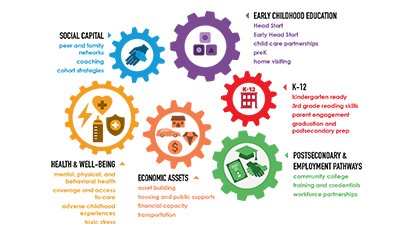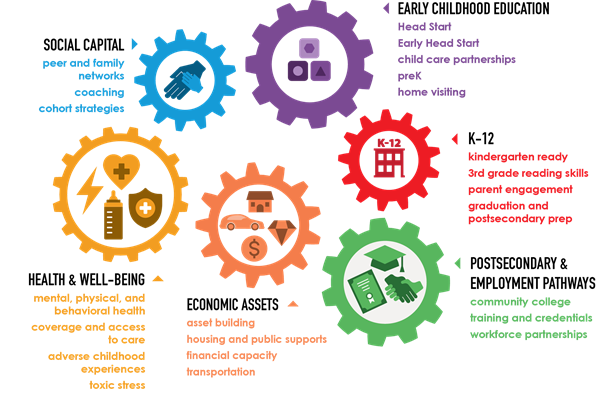PCG Subject Matter Expert Focuses on Brain Science-Informed Practices and the Two-Generation Approach in Human Services

The Two-Generation Approach
Tracy Bell, Public Consulting Group (PCG), became involved with the Kresge Foundation in July 2019. He was contacted by leadership to become a volunteer Advisory Committee member for the foundation’s Human Services Division. Mr. Bell works with other committee members to evaluate funding opportunities for local and state government agencies that meet certain criteria set forth by the foundation.
The mission of the Kresge Foundation’s Human Services Division is to “expand opportunities in American cities by centering racial equity to advance social and economic mobility for families and communities.”1 To achieve this, the Advisory Committee goes through the process of determining funding decisions, so agencies will have opportunities to develop innovation and integrate services. Last year, the Board of Trustees approved 656 grants totaling $165.7 million for all Kresge Foundation divisions.2
Viewing family connection from a holistic lens, the Advisory Committee uses a person-centered, two-generation approach. This strategy, based on brain science-informed practices, “builds family well-being by working with children and the adults in their lives together...”3
The two-generation approach re-emerged several years ago when it was re-introduced into the mainstream by Ascend at the Aspen Institute. Mr. Bell was at the forefront of this initiative while serving as Chief Officer of Workforce Development Employment and Transformation for the Tennessee Department of Human Services.
The two-generation approach functions on a whole-family continuum:4
(Image Courtesy of Ascend: The Aspen Institute)

There are “six key components of the two-generation approach: 1) Postsecondary Education and Employment Pathways; 2) K-12; 3) Early Childhood Education and Development; 4) Economic Assets; 5) Health and Well-Being; and 6) Social Capital.”5
(Image Courtesy of Ascend: The Aspen Institute)

(For more information about the two-generation approach, visit Ascend’s website.)
Funding Awards & Agency Support Strategies
When the Kresge Foundation awards funding to agencies, the agencies become part of a learning community, and they are given training options for technical assistance (TA) provided by the Advisory Committee. Virtual TA, according to the U.S. Department of Health & Human Services, is “a form of planned and ongoing TA delivered remotely with built-in opportunities for interaction and an arc of learning framework that advances informal knowledge to more sophisticated reasoning over time.”6 In-person TA is also a valuable option the Kresge Foundation provides for funded agencies.
When providing TA, the Advisory Committee’s focus is not only on addressing an agency’s main issue, but also identifying the root cause, family dynamics, and family needs so that the solutions identified lead to achievable and sustainable self-sufficiency.
When developing strategies to support agencies, the Advisory Committee also utilizes the Human Services Value Curve created by Harvard University and the human services change organization, Accenture. According to Accenture, “this practical framework tracks human services business model development across four levels”— the Regulative, Collaborative, Integrative, and Generative Business Models. These models promote efficiency in achieving goals and positive outcomes for families on the road to independence.7
In October 2020, Mr. Bell, along with other key Human Services professionals, provided a learning community roundtable discussion at the Memphis NextGen Conference. This session was provided by the Kresge Foundation’s Human Services Division. The group discussed existing challenges and innovative opportunities to increase positive outcomes for the families they serve by leading with Systems Change.
Through technical, procedural, and philanthropic solutions, the Advisory Committee continues to focus on brain science and reducing toxic stress to reduce barriers when families are in search of assistance. According to the Kresge Foundation, “we build on this work by making cross cutting investments focused on developing supportive and aligned policy and building a robust field to advance social and economic mobility.”8
In addition to Mr. Bell’s involvement with the Kresge Foundation, he is affiliated with the American Public Human Services Association (APHSA), Leadership for a Networked World, and Ascend at the Aspen Institute (as mentioned above).
As an IT Project Manager at PCG, Mr. Bell has over 15 years of human service experience. He works with agency executives, analysts, tech writers, and other professionals to coordinate business efforts and respond to the needs of various health and human services organizations. Click here to learn more about Mr. Bell’s subject matter expertise.
Mr. Bell is focused on leading through an information technology perspective. His passion is centered on creating technology solutions that support the business needs and overall mission/vision of health and human services organizations, aimed at assisting and improving lives.
Click here to learn more about PCG’s proven solutions to help human services agencies improve the lives of the communities they serve.
_______________________________
1 No author, “Human Services,” The Kresge Foundation, accessed on November 19, 2020, https://kresge.org/our-work/human-services/
2 No author, “Inside Out and Outside In: Equity: Organic to Our Mission,” Equity: 2019 Kresge Foundation Annual Report, accessed on November 19, 2020, https://equityinsideout.org/
3 No author, “Human Services,” The Kresge Foundation, accessed on November 19, 2020, https://kresge.org/our-work/human-services/
4 No author, “What Is 2Gen?” Ascend: The Aspen Institute, accessed on November 19, 2020, https://ascend.aspeninstitute.org/two-generation/what-is-2gen/
5 No author, “What Is 2Gen?” Ascend: The Aspen Institute, accessed on November 19, 2020, https://ascend.aspeninstitute.org/two-generation/what-is-2gen/
6 Office of the Assistant Secretary for Planning and Evaluation (ASPE), “Improving Human Services Using Virtual Technical Assistance,” U.S. Department of Health & Human Services, April 1, 2020, https://aspe.hhs.gov/virtual-technical-assistance
7 Accenture Consulting, “Executive Summary: At a Human Services Tipping Point: How Leaders Move from Ideas to Outcomes,” Accenture, accessed on November 19, 2020, https://www.accenture.com/us-en/_acnmedia/pdf-3/accenture-human-services-tipping-point-exec-summary-web.pdf
8 No author, “Human Services,” The Kresge Foundation, accessed on November 19, 2020, https://kresge.org/our-work/human-services/
